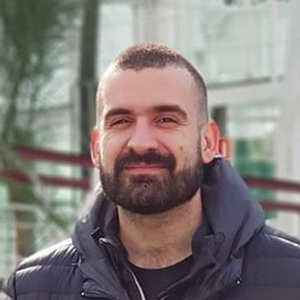Calidoscopi Arnau Roig
3. Kaleidoscope
We need to change our ideology

Arnau Roig, lecturer in the UPF Departament of Translation and Language Sciences
When people ask me where the women are, I have to admit that I have a privileged perspective on the issue: that of a man in a faculty where women are the norm. The vast majority of my students are women, many of my colleagues... Women are a fixture in the Faculty of Translation and Language Sciences. It is the only faculty at UPF with an almost equal number of male and female full professors and where the majority of tenured lecturers are women. It is the only one where all the senior lecturers are women; none are men. Nevertheless, when you look at the other faculties, you realize that it is an oasis and just how far we have to go.
These women, my colleagues, have long been struggling to reclaim spaces traditionally occupied by men. And the number of people who think we need to move beyond good intentions and numerical equality and effect a structural change in how we educate is growing. Certainly, we need to have more women in positions of power to instigate that change, but we also need to undertake a change in ideology that will reshape the very foundations of how we teach.
The new Minor in Gender Studies or campaigns such as Docència #AmbPerspectiva (Teaching #WithPerspective), aimed at drawing attention to the lack of women authors in our syllabi, the power dynamics between men and women in the classroom, the heteropatriarchal biases of the content... have caused many people, including myself, to reconsider the need to offer students more gender-balanced reading lists, a more inclusive experience, and critical thinking that lays biases bare. It is our job, as teachers, to help educate and empower the many women who fill our classrooms, whilst at the same time teaching people to think about the privilege of our men.
It is not a question of quality or marginality – women outnumber us in the faculty and the world. It is about stopping talking and listening, about doing what is hardest for us: losing our privilege and ensuring that other people lose theirs, too. It is about saying ‘enough’ to someone who is monopolizing the conversation in order to make room for other voices (trained and used to keeping quiet from the time they are young); about criticizing established authors who, despite their incredible contributions to the discipline, have toxic ideologies; about no longer letting people off the hook because ‘it was normal at the time’ and questioning what we perceive to be normal. In short, we need to see with a gender perspective and embrace it in academia.
In my classroom, we have begun to recover literature written by women and translate it into English to make it more visible. However, we are not satisfied with doing just that, so we are also working to effect a more radical change: we share our work under free culture licences to make it accessible; we reflect on colonialism in works from centuries ago; and we look into group work dynamics to locate abuses of power. The change will be interdisciplinary or it will not be at all.
When people ask me where the women are, I like to think that I am fortunate to have them close to me and that every day they show me that they are the future.
